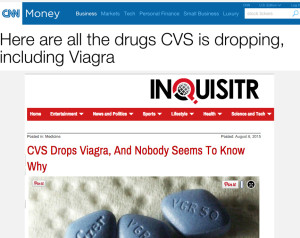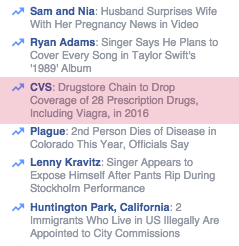I’ve noticed some people claim on social media that CVS will stop selling Viagra next year. When I first glanced at the Trending section of Facebook, I thought that was true for a few seconds.
In Trending, it reads, “CVS: Drugstore Chain to Drop Coverage of 28 Prescription Drugs, Including Viagra, in 2016”.
The “Drop Coverage” part is important. What’s happening is that CVS Caremark – which is a prescription coverage program that is a subsidiary of CVS Health – will no longer cover Viagra and 27 other drugs to those who have benefits with them. The CVS Pharmacy stores will still be selling Viagra. If you have a prescription and you have insurance that covers it, or you’re willing to self-pay, you can still get it from CVS Pharmacy.
An important thing to keep in mind is that some of these drugs are no longer covered because generic versions are available. This is not unusual for prescription drug coverage companies to do. Generics have the same active ingredients as the name brands. For example, Cymbalta is available in the United States in generic form. With rare exception, switching from name brand to generics won’t cause you any health problems. The part that may be tricky are drugs that are not covered because there are cheaper alternatives. For example, an eye drop medicine that gives me great relief isn’t covered with the health insurance coverage I currently have. The alternative that was suggested hasn’t worked as well for me. But that my personal experience. Sometimes the cheaper alternatives can work just as well for you. I’ve had to make some other switches that worked out fine.
From CNN Money:
CVS (CVS) said the medicines dropped from the list of drugs the company covers all have cheaper equivalents that are still covered by its insurance plan.
For example, customers taking Pfizer’s (PFE) Viagra for erectile dysfunction will be able to take Cialis, made by Eli Lilly (LLY). CVS stopped covering Bayer’s rival ED drug Levitra in January 2012.
“For those drugs that are removed, equally effective products with lower overall costs remain available,” CVS said in a statement. “Since introducing our industry-leading and rigorous approach … in 2012, we have delivered significant savings for our plan sponsors.”
I want to give props to sites like Consumerist and writer Laura Northrup for having a clear title and a comprehensive article.
Some of the other articles I saw had misleading titles. Some websites and blog networks have editors that will change the title a writer originally used to get more clicks. I don’t know if that’s what happened with this particular news story, but I’m mentioning this because it happens frequently. Sometimes writers come up with these click-grabbing headlines themselves.
Here’s how it looks on some other sites:

Although these headlines aren’t technically false, people who only read the titles that show up on social media are given the impression that CVS is dropping the drug from its pharmacy shelves. This is why it’s important to read an article before forming an opinion. No matter how concise an article title may seem, it might not be accurate.
Update August 6, 2015 3:23 PM PDT: I noticed that Facebook has improved the description for this topic in the Trending section. Nice.


